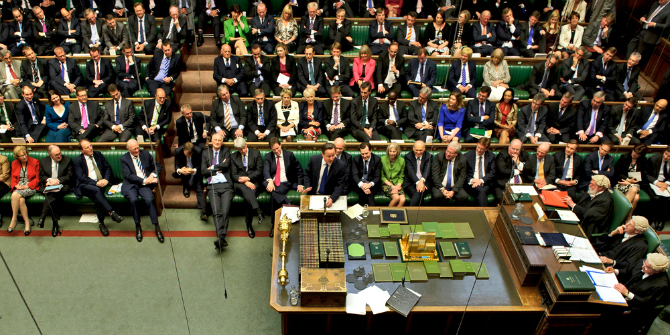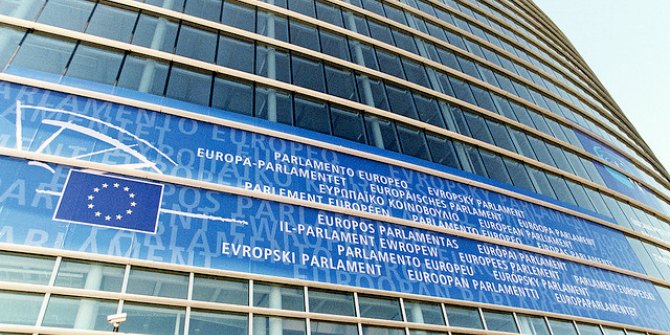 Rhiannon Vickers should be congratulated for delivering a concise, balanced, and accessible account of how left of centre thinking on foreign policy has evolved over the last sixty years, writes Dr Matthew Partridge.
Rhiannon Vickers should be congratulated for delivering a concise, balanced, and accessible account of how left of centre thinking on foreign policy has evolved over the last sixty years, writes Dr Matthew Partridge.
 The Labour Party and the World: Volume 2: Labour’s Foreign Policy Since 1951. Rhiannon Vickers. Manchester University Press. 2011.
The Labour Party and the World: Volume 2: Labour’s Foreign Policy Since 1951. Rhiannon Vickers. Manchester University Press. 2011.
Writing a book about the Labour Party’s approach to foreign affairs while Labour is in opposition and political debate focuses on the economy is certainly counter-intuitive, making The Labour Party and the World: Labour’s Foreign Policy Since 1951 less than topical. However, it also means that the sequel to Rhiannon Vickers’ study of Labour’s Foreign Policy in the first half of the twentieth century neatly begins and ends with Labour governments leaving office.
As she makes clear in the first chapter, Vickers believes that many of the principles that governed Labour’s foreign policy formation in its early years, particularly internationalism and a distaste for military intervention, persisted right up to the present day. Indeed, she emphasises that, “the belief in internationalism and an international community…underpinned Labour’s support for the establishment of the League of Nations following the First World War and the United Nations after the Second World War” (p. 17). Similarly, the author claims that the modern party has been, and continues to be, “strongly influenced by the pacifist outlook of the Independent Labour Party” (p. 21).
 Each of the six middle chapters focuses on a specific chronological period ranging from the thirteen years of opposition until 1964 to the nine years following the September 11th 2001 attacks. With the possible exception of the 1990s, each of these periods was characterised by heated internal debate over defence and foreign policy. Although issues like Vietnam and Rhodesia (Zimbabwe) did briefly feature in these discussions, the two issues that commanded most attention, for the longest period, were the continued existence of Britain’s nuclear deterrent and the question of Britain’s policy towards the European Community.
Each of the six middle chapters focuses on a specific chronological period ranging from the thirteen years of opposition until 1964 to the nine years following the September 11th 2001 attacks. With the possible exception of the 1990s, each of these periods was characterised by heated internal debate over defence and foreign policy. Although issues like Vietnam and Rhodesia (Zimbabwe) did briefly feature in these discussions, the two issues that commanded most attention, for the longest period, were the continued existence of Britain’s nuclear deterrent and the question of Britain’s policy towards the European Community.
Of the two, the debate over nuclear weapons was the more disruptive since it lasted the longest and had the most direct impact on Britain’s national security and role in the world. As Vickers points out, Labour’s lurch towards pacifism in the 1980s meant that the Conservatives “successfully labelled Labour as being weak on foreign and defence policy and asserted that Labour could not be trusted with the nation’s security” (p. 123). Although there were furious internal debates over Europe, culminating in the farcical situation of Cabinet ministers in Harold Wilson’s government taking opposing positions in the 1975 referendum, mixed public feelings on the issue made the issue less politically toxic.
The author’s comment that, “for large parts of Labour’s history, foreign and defence policy has been among the most contentious issues facing the party” (p. 149.), should therefore come as no surprise. However, some of her conclusions are less defensible, particularly her counter-intuitive belief that the temporary triumph of unilateralism over Atlanticism in the Foot and early Kinnock years meant that Labour was “possibly better prepared to deal with the immense changes in the international system at the turn of the 1990s, with the end of the Cold War” (Ibid). It could just as well be argued that the early Cold War period in Western Europe provide the best template for promoting democracy in the Middle East,
Indeed, given that Tony Blair’s working relationship with Clinton and George W Bush parallels that of Clement Attlee and Harry Truman, it might have been better for Vickers to begin her second volume in 1945, rather than six years later. However, she should be truly congratulated for delivering an account of how left of centre thinking on foreign policy has evolved over the last sixty years that is concise, balanced, and accessible to students at all levels.
This review was first published on the LSE British Politics and Policy blog on 8th January 2012.
——————————————————————————————-
Dr Matthew Partridge completed a PhD in Economic History in 2011 at the London School of Economics. A senior writer for MoneyWeek, he has also written for The Guardian, Times Higher Education and the websites of Prospect and New Statesman.







